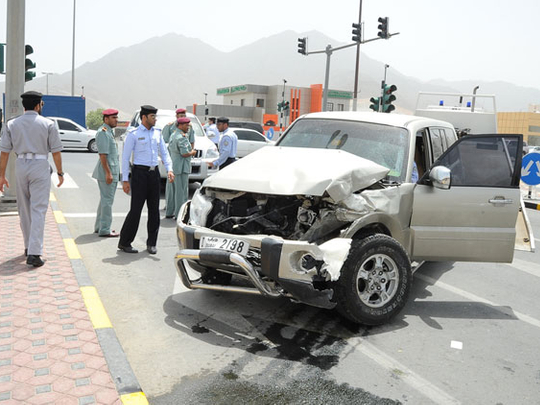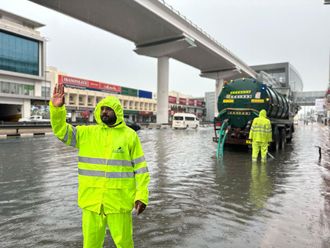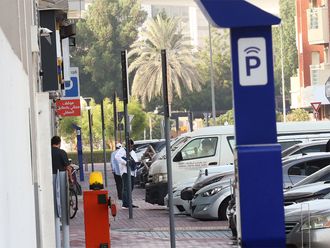
Abu Dhabi: Traffic accidents and fatalities cost the UAE nearly Dh17 billion between 2009 and 2011, a recent report by the Department of Economic Development (DED) shows.
The total cost, which consists of the direct financial burden of traffic accidents as well as the indirect socio-psychological costs, also amounted to 1.6 per cent of the country’s gross domestic product (DP) which is Dh1.248 trillion, according to official study by the UAE government.
These figures were calculated using an individual’s annual income, their age and the age of retirement, the cost of guardianship before and after the age of retirement, and other indirect cost estimations.
In 2011 alone, there were 6,700 car crashes. These crashes resulted in 720 deaths and 7,808 injuries.
The report however also revealed a 14.4 per cent decline in the cost of car accidents over the past three years.
Nouman Ashour, a chief economist at DED, told Gulf News: “In spite of this decline in the number of accidents, the figure is still high compared to other countries.”
“We had about 10,000 road accidents in 2010 and the losses are immense. The number of accidents in the UAE is more than that in the US and UK. The cost of car accidents was estimated at Dh10 billion in 2010 in the UAE,” Karim Rizkallah, managing director of TransCore in the Mena Region at the Intelligent Traffic Systems Middle East, told Gulf News. “In the UK, the traffic fatalities per 100,000 is about eight persons,” a United National Development Programme showed.
“More than 6,485 people had died and more than 36,000 were injured in over 485,000 traffic accidents during 2008 and 2009 in Saudi Arabia,” according to a report issued by the Saudi Ministry of Interior.
“The depreciation resulting from these accidents could have been invested in other useful fields, including in the improvement of infrastructure,” he said.
Ashour also explained that any increase in the numbers of car crashes comes at a high cost to health services, including medication and hospital stays.
“It also affects the tourism sector because tourists avoid coming to countries with high levels of car accidents.” Ashour said this leads to a loss in the source of income.
According to the DED report, the number of traffic fatalities by the end of 2011 compared to 2009 had declined by 25.5 per cent across the UAE, and by 19 per cent in Abu Dhabi. Still, in 2011 alone, the emirate of Abu Dhabi saw 2,280 or 46.4 per cent of all traffic accidents in the country.
Police statistics show 963 motorists were killed in traffic accidents across the UAE in 2009, while the toll was 1,072 in 2008. Rate of deaths due to traffic accidents per 100,000 of the population was 15.8 in 2007. This fell to 13.3 in 2008 and down to 11.8 in 2009.
“Our objective is to reduce this by 1.5 per cent annually.” The total number of accidents dropped from 10,124 in 2008 to 8,612 in 2009, a 15 per cent decline.
The number of traffic-related deaths in Abu Dhabi fell from 376 in 2010 to 334 in 2011, or 13 people per 100,000 inhabitants, police have said.
Among the various recommendations outlined in the report by DED analysts was the immediate need for more drivers and other road users to abide by traffic rules and regulations.
Fatalities from traffic accidents declined in 2011 by 12.8 per cent compared to 2010, the fatality numbers went down from 826 in 2010 to 720 in 2011.
According to police statistics, the mortality rate went down from 10 to 8.49 per 100,000 inhabitants.
Lasting impact
The DED report also highlighted how severe psychological stress and social burdens result from traffic accidents, including the burden of caring for people who are injured or permanently disabled.
“A traffic accident affects everyone involved in it, from the person driving the car to the people witnessing the incident and the various family members of the victims. Major depressive episodes are common, and surviving victims suffer from post traumatic stress disorders that often take years of treatment to resolve,” Dr Dolly Habbal, clinical psychologist at the Gulf Diagnostics Centre Hospital, told Gulf News.
In addition, various disruptive phobias can also develop among victims, such as a fear of driving.
“These kinds of fears interrupt everyday routines and functioning, and also cause people to become socially withdrawn and demotivated., since many expatriate workers lack support groups and family support, the socio-psychological costs of traffic accidents become quite pronounced,” Dr Habbal said.
Nearly 7 to 10 per cent of Dr Habbal’s patients are afflicted by depression or post-traumatic stress as a result of traffic accidents, she said. This rate has however remained rather stable over the last five years, the psychologist said.











